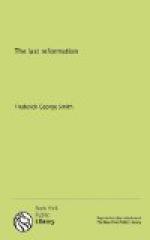[Sidenote: Ecclesiasticism perpetuated]
As might be expected, numerous modifications of the principles and usages of the papal church occurred in the change from imperial control to the state-church system. This diversity took place in the different countries in accordance either with prevailing conditions and sentiments or with the whims and caprices of the reigning sovereigns. While some retained the episcopate, others greatly modified it or rejected it altogether. In forms of worship, ritual, and other things numerous changes were also made. But notwithstanding the diversity in forms of worship and in church polity, in two respects there was perfect agreement among all the Reformed churches—two things brought over from the papacy—namely, first, the idea of a self-perpetuating clerical caste possessing in their corporate capacity legislative and judicial authority over the church; and second, the centralization under a human headship of administrative functions, instead of that local autonomy which prevailed in the congregations of apostolic times. The doctrine of the “power of the keys,” a power wielded by a clerical corporation with authority to prescribe the very manner and form of worshiping God and to require men to comply therewith or else exclude them from gospel privileges. That doctrine was accepted without question. It was the same power in principle as that which was wielded so terribly by Gregory VII in the papal church of the eleventh century.
CHAPTER VIII
MODERN SECTS
[Sidenote: A mental picture]
Picture a keen observer living in the middle of the first century of our era. He travels about from place to place studying the development, nature, and fruits of the recently established religious phenomenon—Christianity. He observes the purity of its doctrines and the high moral standard exemplified in the lives of its adherents, and he inquires particularly concerning the secret of that mysterious bond which unites in one body and in one fellowship, sympathy, and love the entire society of believers in Jesus. He departs. After the lapse of long ages he returns near the beginning of the twentieth century, and lo, what is it that meets his astonished vision? The mournful spectacle of a divided Christendom; of rival sects compassing land and sea to make proselytes; of the spiritual alienation of those who, in reality, belong to the one divine family; of waste and inefficiency in methods of evangelical effort; not to mention the error, pride, and worldliness inherent in the gigantic ecclesiastical systems known as denominational churches. What a change!
It is useless to minimize the evils inherent in the sect system. Intelligent men the world over need not the services of an eye-specialist to see clearly that there is something wrong with modern Christendom; that the sect system does not represent the standard of primitive Christianity, but that in reality the sect principle misrepresents the apostolic ideal as portrayed in the New Testament. We may as well face the facts honestly and seek for a remedy for this disease that has so long marred the beauty and corrupted the nature of the true Christian system.




